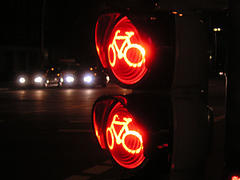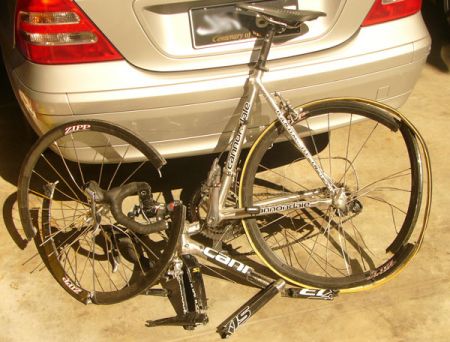I see that Inside Sport has labelled cycling "Australia's Deadliest Sport". Interesting. In his editorial, Graem Sims says:
Talk to any elite cyclist – anyone who rides regularly, for that matter – and they'll be able to recite a list of incidents and/or near misses where their lives have flashed before their eyes. Every time they get on their bikes to train, they not only take their lives into their hands, they trust their lives to the thousands of anonymous strangers behind the wheels of the vehicles they share the roads with.
Very true. In what other sport, recreation, or occupation do participants place so much trust in the unknown and questionable ability of anonymous strangers? Road workers, perhaps?
The feature article by Dan Rookwood points out that as a nation Australia punches above its weight in world cycling, and this comes on the back of the commitment of aspiring cyclists to put in endless hours on the road
but that increasingly, young riders face the very real possibility that their every simple training ride just might be their last
.
Talented young cyclists are killed and injured on the roads, but few such incidents receive the the same media attention as did the crash that killed Amy Gillett and injured several of her team mates. Australians love their world-class athletes and were universally horrified by that smash, but there is a fundamental disconnect when it comes to looking out for cyclists in general. When they get behind the wheel, the average Australian seems to consider a cyclist a mere roadblock:
Combine the health benefits of cycling with awareness of green issues and you'd reckon that motorists would be going out of their way to support those who promote pedal power while easing rush-hour congestion. Instead, cyclists inflame motorists. When they cycle solo, they're seen as some kind of lone pathogen poisoning our cities arteries. When they band together in pelotons, they're full-blown infections.
There's a tired old argument brought out in Rookwood's article that goes unchallenged (and hence, implicitly endorsed):
Motorists…will tell you it's a two-way street – that if cyclists want to be treated within the road rules, they should start by obeying the road rules.
[Emphasis as printed]
This is complete and utter bollocks. Cyclists' legitimate use the road is not contingent on their obeying the road rules. And neither is it for motorists: witness the level of speeding, drink driving, mobile phone and other distraction and, yes, even red light running by motorists. And yet no one is arguing that all motorists clean up their act before they are allowed out on the road, neither do the actions of a negligent minority condemn all drivers. Why should cyclists be held to a different standard?
I do not endorse or support flouting the road rules by any group of road users, so it particularly rubs me up the wrong way when Rookwood continues:
But such is the intensity of anti-cyclist behaviour that it's given rise to an every-man-for-himself attitude and riders no longer see any point in pedalling by the rules…weaving in and out of multi-lane traffic at speeds like kamikaze slalom skiers…they startle then abuse any drivers in their maze-like path; they ride wearing iPods but without lights. And, perhaps most enraging of all, they jump traffic lights
I don't know who he's been talking to, but that's one heck of a sweeping generalisation. Plenty of cyclists scrupulously follow the road rules and are just as appalled as anyone else when the "I'm alright Jack" riders roll through red lights or do other illegal and reckless things.
In fairness, Rookwood paints an even more bleak picture of motorists
too wrapped up in their air-bagged cocoons too busy talking on the phone, listening to their CDs or sat navs, taking a drink or calming the screaming little 'uns in the back seat – to truly appreciate the gritty reality of irresponsible driving.
A generalisation again, but it's about consequences. The TAC's "Distracted Drivers Are Dangerous" campaign has it exactly right: driving while writing a text message could very well cause injury and death to others. On the other hand to a very large extent the only people that red light running cyclists are endangering are themselves (not discounting the psychological impact on a driver who has run down a cyclist through no fault of their own). Such riders are dickheads and I don't justify or excuse them, but their potential impact is so much smaller.
And here's where Urban Commuter's excellent discussion about dominant threat kicks in:
Is it because the transport mode which poses the greater capacity to endanger others (The Lorry as the "Dominant Threat") is legislated for and treated with, the additional responsibility which goes hand in hand with driving a vehicle capable of more damage and casualty if not driven correctly. I.e. Lorry driving is treated as a profession, and is regularly monitored (e.g. tachographs, working hours regulations, etc.)…
Now come back to cycling, and the issue becomes clear – Cyclists share the road with vehicles, primarily cars, which are in this comparison; the dominant threat. What is patently clear from on-road experience, is that drivers (specifically – average, non-advanced-drivers) do not have enough pressures exerted on them, encouraging them to exercise high driving skill (consistently safe driving) at all times.
Average car drivers don't intend to endanger cyclists, but they do. Average drivers simply have too many options to commit unintentional, dangerous acts. Even a driver's minor oversight is magnified in outcome, by the weight and speed of the car.
Rookwood highlights this with a quote on inexperienced drivers from Professor Ian Johnston, former director of Monash University's Accident Research Centre:
"They know how to change gears and how to steer, but they don't yet know how to read the road – how to adjust to conditions. We need to introduce graduated licensing that extends the learning period and increases the amount of supervised driver before a learner is allowed to go solo."
Ain't that the truth? It's high time society accepted that driving is a complex and highly skilled activity and that a driving license is a privilege and not a right. And people really need to earn that privilege. If you have any doubts about this, have a little read of what happened to Noel Davies.
For cyclists there is also a flip-side:
"They say you never forget how to ride a bike, but that's not true," says Warren Salomon, whose company, Sustainable Transport Consultants, designs bicycle routes for state capitals. "If you've not cycled in 20 years, you're rusty; you're like a learner driver. There's a growing number of unskilled riders getting on roads and facing a motorist population that isn't ready of them – that's a bad combination."
I'll say! I don't think I've really shouted about rider education before, but this is a good reminder that it makes great sense. It's no insurance policy but a cyclist education course would make an excellent gift for a new (or born-again) cyclist.
I agree entirely with what Euan says, but in fairness the article does say that cycling is Australia's most dangerous sport. I don't think too many (sane) people would consider ordinary road driving a sport (although clearly some nutjobs have delusions of adequacy in that regard).
If we're just talking about sport, I honestly don't know if cycling really is deadlier than something like motor sports (if someone has some information on this, please let me know). But it must be noted that motor sports generally take place in controlled environments where only licensed participants and officials can get really close to the action; everyone else is kept well clear for the safety of everyone concerned. So I wouldn't be at all surprised if, in terms of death and injury rates, motor sports were safer for participants despite the considerably higher speeds.



Comments
Did that article conveniently neglect to mention that the riskiest things most people do is drive a car?
Look at the raw numbers and riding a bike's four times riskier than driving a car. When you break it down in to demographics skilled cyclists appear to be at no real greater risk than any other road user.
Unfortunately the highest risk group are the under 15s.